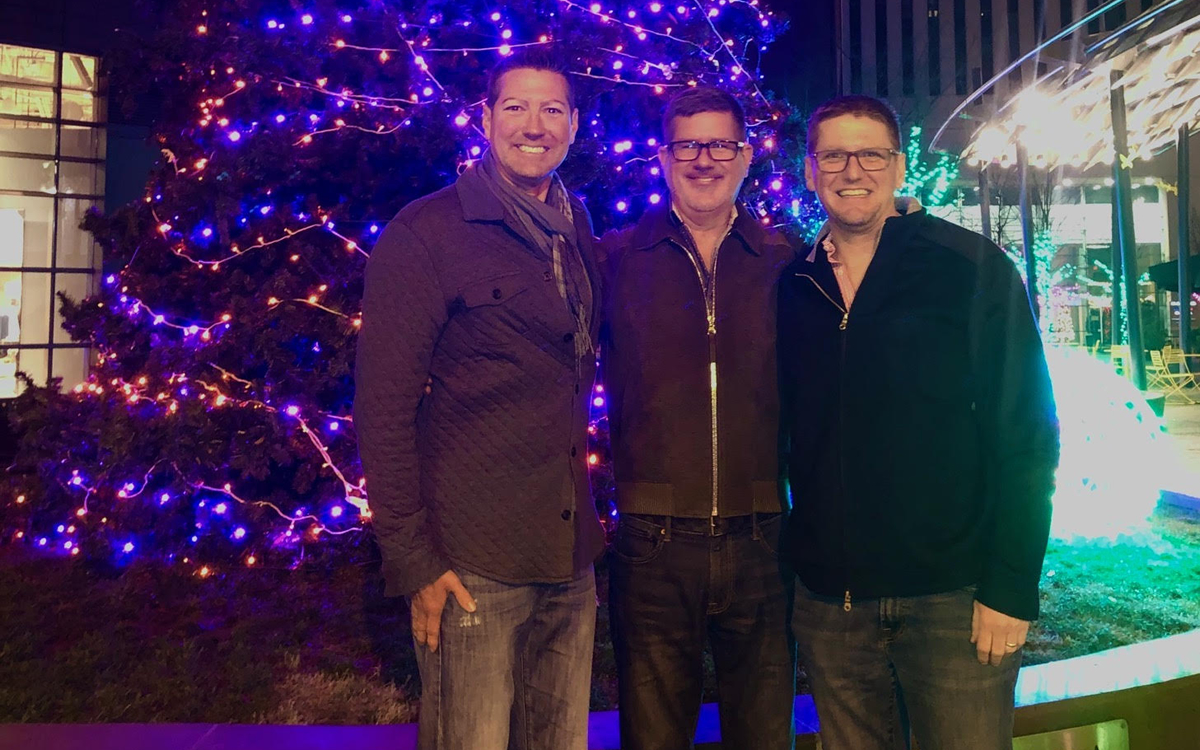Opinions
I survived overwhelming grief thanks to unexpected support systems
A lifeline I didn’t know I had — or needed

When tragedy strikes, you never know what will happen next. What’s the next punch in the gut that will knock you unconscious? That is what happened to me on March 20, 2021, when my beautiful, healthy, loving brother Tom died suddenly of a heart attack. A man who was 53 years old, ran five miles a day, and ate salads, tuna, and grilled chicken. And here I was, his younger brother, who sometimes eats poorly and rarely exercises, left to pick up the pieces once again.
The news came as a shock. My husband and I were relaxing, reading the paper and having a mimosa. Then, my brother’s mother-in-law called. As she relayed to me what had happened, I blacked out, unable to comprehend what she was saying. In fact, I did not even know who she was. I handed the phone to my husband, confused and convinced that what was happening was not actually happening. But it was happening. My brother was dead, and my precious 15-year-old niece was alone with him when it occurred.
I collapsed on the floor and was inconsolable, and I remained in that state for hours. Even our two cats were concerned, circling me nonstop, as I loudly wailed and screamed, noises they had never heard in the 11 years since we adopted them from the shelter. Finally, my husband Paul told me that I had to call my parents to tell them what had happened. Somehow, I mustered the strength to do so, recalling the similar moment in 1997 when my parents called me to inform me that my oldest brother David had died by suicide. I called them, but I don’t remember much of what I said. All I remember was my mom saying, “Not Tom!” Next, I called my mom’s sister and informed her of the news. More shock, grief, anguish, and confusion. Worried about my parents being alone, I left messages with their friends, Jack and Nina, and asked if they could go over and be with them until I could get there.
My husband, Paul, and I struggled that day to simply figure out how and when to fly to South Carolina to be with my family. I was completely useless, unable to do anything to help with arrangements. Paul put aside his grief for the loss of his brother-in-law and friend to take care of me, like he’s always done. And ever since, he has continued to do so—through all of my anxiety attacks, grief, anger, and inability to attend social functions. He has been my rock, and my love for him has never been greater.
What happened in the days after I got to South Carolina remains a blur — flowers, gifts, kind calls, me having to write my brother’s obituary and help with arrangements, including picking up the death certificate — on my birthday no less. What also happened was silence. Silence from friends and family members who I assumed would be there in my greatest moment of need but were surprisingly absent. Finally, my good friend Kevin said it best: “Don’t focus on those who have disappointed you; focus on those who have surprised you by being there.”
Great advice? Yes. Easy to follow? Not exactly.
However, I followed Kevin’s advice. I was confident that I could rely on my closest group of friends — the “Balt 8” (named for eight of us who became great friends while living in Baltimore). Later that year, while attending my first party since Tom’s death, I had a horrific anxiety attack, and Kevin asked no questions and instead took me for a long walk in the cold and misty rain. My best friend, Joy, who I have known since college and is like a sister to me, was there day and night. My close friend Maureen sent me TV recommendations to help make me laugh.
While I knew that the Balt 8 would lift me up, what I remember the most during this time were the people who unexpectedly came to my rescue.
After Tom died, one of the first people who reached out to me was Renee, a friend from high school who I had not seen in person since our graduation in 1988. Suddenly this long-lost high school classmate became a rock who I would rely on for months to come and who sent care baskets filled with goodies from her home state of Louisiana. I guess it shouldn’t surprise me — on Jan. 6, 2021, when I, along, with most Americans watched in horror as a mob besieged the U.S. Capitol, I was living not too far away. Too shaken by what I had witnessed, I called my supervisor at The Trevor Project to let them know that I would not be able to perform my volunteer shift that night. Anxiously, I waited for my husband to get home safely from work when I saw an incoming call via Facebook Messenger. It was Renee. She just wanted to make sure that my husband and I were safe.
Other friends came through via simple acts — my friends Tim and Regan in Seattle held a candlelit vigil for my brother whom they had never met, while my friend Steve sends me texts often just to see how I was doing.
While we live in Washington, D.C., we still keep our sailboat in Baltimore where we were lucky enough to land on the marina’s J-Dock and quickly made friends. Self-dubbed “The Island of Misfit Toys,” after the classic Christmas special, somehow, we were all brought together and became friends. During my grief period, everyone on the J-Dock brought something different to the table. Some brought tenderness and love; others brought levity with crude jokes that I was embarrassed to laugh at. Our boat neighbor Carrie asked me each morning how I was doing, and when I was having a tough day, she’d recommend we go to the pool, where we would relax, have a cocktail and laugh nonstop, usually at ourselves. When the bouquet of flowers for Tom’s funeral arrived from the J-Dock, it was obvious that Carrie, a fellow college football fan, had chosen it — the beautiful orange and purple flowers were a testament to my brother’s beloved favorite team, the Clemson Tigers. It was very typical of Carrie — she shows her love in a quiet, reserved way, but it’s still felt strongly.
While I appreciated everyone’s support at the marina, there are two friends that I relied on more than any — Jon and Jill.
After Tom’s death, I learned that my family has a history of heart disease. I went to my doctor and had every conceivable heart-related test, and thankfully, there was no evidence of heart disease. However, that didn’t completely eliminate my fears. The thoughts kept racing in my head: “Tom was the healthy one, so how can I be OK?” One day, I called Jon to ask him if he could stay on the phone with me, as I was having an anxiety attack. With his trademark humor, he quickly said, “You are not having a heart attack, drama queen.” But then he added, “I’ll be right there.” And he was, time and time again.
Later that summer, I had a similar anxiety attack, and I texted Jill. Luckily, she works from her boat, so she was home, and when I asked if she had a few minutes, instinctively, she knew something was up. Within seconds, I could feel my boat shift, signaling that someone was coming aboard, and there was Jill with her chihuahua, Little Dog, to help calm my nerves. “I don’t know what to do,” Jill admitted. I explained that I didn’t either. “Why don’t we go for a walk and get off our boats?” she suggested. I agreed to walk just around the marina, as I did not feel emotionally strong enough to leave the safety net of the docks. We discussed what anxiety feels like, but we also enjoyed our surroundings and Little Dog’s idiosyncrasies. And I laughed. Thank goodness, I laughed.
My brother’s death also resulted in a seismic shift in my relationship with his ex-wife, Chris. On the surface, Tom and Chris’s relationship may have seemed unconventional to many — over the course of 30-plus years, they dated, broke up, dated again, married and divorced, but through it all, they remained best friends. They hung out together all the time, ran together several times a week, and, most importantly, they raised their amazing and kind daughter, Jordan.
When my oldest brother David died by suicide in 1997, Tom was the one who found him. Even though they were not dating at the time, Chris was there for my family, and, most importantly, Tom. Tom was frustratingly closed off emotionally sometimes, and never more so than after David’s death. Chris was the one person who could get him to open up, so thankfully he clung to her.
While Chris and I at times had grown apart since the divorce, Tom’s death thrust us back together. We were no longer simply former in-laws and friends; we were partners in pain.
Will I survive this? Yes, because I have no other choice. How? I have no idea, but I have to hold onto hope that whenever I am struggling, there will be someone who will unexpectedly fill my heart with love.
Gregory J. Alexander is a freelance writer and editor who lives in Washington, D.C., with his husband, Paul, and two cats.
Opinions
Navigating employer-sponsored health insurance, care
One in four trans patients denied coverage for gender-affirming care

Even though 86% of transgender Americans have health insurance, one in four reported being denied coverage for gender-affirming care in the 2015 and 2022 U.S. Transgender surveys. These denials can occur when an insurance plan contains a categorical exclusion of gender-affirming care. It is important to note that transgender employees who receive insurance coverage through their employers are entitled to legal protections.
Employers are responsible for ensuring that the insurance plans they provide do not violate any laws, including anti-discrimination laws. In 1983, the Supreme Court ruled that under Title VII of the Civil Rights Act of 1964, employers are legally required to provide employees with equal pay and benefits, including health insurance. This protection now extends to transgender employees after the Supreme Court’s ruling in Bostock v. Clayton County (2020), which clarified that sex discrimination under Title VII includes gender identity discrimination.
Since Bostock, several transgender employees have successfully sued their employers for discrimination because they were denied coverage of gender-affirming care by their employers’ insurance. While employers can be held liable under Title VII, it remains unclear whether insurance companies will be held liable under Section 1557, the antidiscrimination provision of the Affordable Care Act (ACA), in the future.
Most—if not all—courts have ruled that employers can be held liable for choosing insurance plans with categorical exclusions of gender-affirming care. A categorical exclusion is when an insurance plan has a blanket ban of coverage for certain services. Although discrimination cases generally require proof of intent to discriminate, it is not required of transgender employees because categorical exclusions of gender-affirming care are facially discriminatory (i.e. the policy is explicitly and obviously discriminatory in nature).
In Kadel v. Folwell (2024), the Fourth Circuit court considered the Fourteenth Amendment, Title IX, and ACA claims in a consolidated case considering two state health plans: the State of North Carolina’s insurance plans for teachers and West Virginia’s Medicaid program. The Fourth Circuit court held that it is impossible to ban coverage of gender-affirming care without discriminating against transgender people because (1) gender dysphoria is a legitimate medical diagnosis which requires medically necessary treatment; and (2) the services provided under gender-affirming care are also provided to cisgender patients for other medical diagnoses. In short, there is sufficient evidence of discriminatory intent because categorical exclusions of gender-affirming care are facially discriminatory. Under Kadel, the Fourth Circuit also ruled that a policy does not have to explicitly exclude transgender patients. “Rewording the policies to use a proxy,” like sex changes or sex modification, is still facially discriminatory.
Along a similar vein, in Lange v. Houston County (2024), the Eleventh Circuit court found that the Sheriff’s Office’s categorical exclusion of gender-affirming care was a violation of Title VII. Agreeing with the reasoning in Kadel, the court cited a 1991 Supreme Court Case which ruled that proof of intent to discriminate is not needed for facially discriminatory policies. The court also held Anthem Blue Cross liable because third-party administrators in the Eleventh Circuit (i.e., Alabama, Florida, and Georgia) can be held liable as an employer if they make employment decisions as the authorized agent of an employer. However, this decision is unique to the said jurisdictions, and the liability of third-party administrators/insurance providers remains generally unclear. Moreover, the decision is not final because the court granted an en banc appeal, and a panel of all twelve judges re-heard the case in February 2025. The decision after re-hearing remains to be seen.
Recently, Executive Order 14168 and the EEOC’s motion to dismiss its lawsuit against Harmony Hospitality on behalf of a transgender worker prompted concerns over transgender employees’ ability to bring federal discrimination claims. While such concerns are understandable, there has yet been any mandate prohibiting the EEOC from issuing right to sue to transgender individuals. In other words, even if the EEOC may not investigate and file lawsuits on behalf of transgender individuals, it does not bar private parties from doing so. Ultimately, the executive branch alone does not have the power to make changes to the Constitution or any federal statutes. It is up to the legislatures to amend laws and the Constitution, and courts to interpret and rule on constitutionality.
Protections Against Discrimination by Insurers Under Section 1557 Remain Unclear
While employers can be held liable for categorical exclusions of gender-affirming care, employees may be less likely to find relief for legal claims against insurers regarding discrimination on the basis of gender identity. Since Bostock, courts have found insurers liable for denying coverage of gender affirming care under Section 1557 of the ACA, extending sex discrimination to include gender identity. Recent litigation surrounding Section 1557 and the new presidential administration may precede a change in this trend.
In May 2024, the Biden administration issued a final rule implementing Section 1557.It reversed the rule put forth by the Trump administration four years prior, which had revised the Obama administration’s interpretation of the statute. The Biden administration’s final rule defined sex discrimination to include discrimination on the basis of gender identity and sexual orientation. Additionally, under the new rule, a wider swath of insurers and third-party administrators that receive federal financial assistance would be subject to Section 1557.
However, in July 2024, a Mississippi District judge granted a nationwide injunction preventing the Department of Health and Human Services from enforcing the final rule’s prohibition of sex discrimination with respect to gender identity. Additionally, executive orders during the early days of the Trump administration, and guidance from the Department of Health and Human Services that followed, rescinded wide swaths of Biden-era guidance extending sex discrimination protections to include discrimination based on gender identity. It is not yet clear how the new administration’s position on Section 1557 will impact courts’ decision-making regarding insurer liability and the extent of sex discrimination provisions in relation to gender identity going forward.
As the recent history of Section 1557 demonstrates, executive actions may influence the implementation of statutory antidiscrimination provisions, but do not change the law itself. While employers continue to face liability for discrimination towards employees seeking insurance coverage of gender-affirming care under Title VII, some protections remain on less certain ground as the United States enters a new presidential administration.
Ting Cheung, Luke Lamberti, and Neha Sharma are with Sanford Heisler Sharp McKnight.
Commentary
A conversation about queers and class
As a barback, I see our community’s elitism up close

In the bar, on the way to its now-Instafamous bathrooms, there’s a sign that reads, “queer & trans liberation means economic justice for all.”
I remember seeing that sign the first week the bar opened, and ever since I often find myself reflecting on that message. I stand fully in agreement. That’s why laws protecting queers in the workplace are essential, for far too often we are targeted otherwise. It’s also why I love working at the bar, since it provides opportunities for queers from all over the spectrum to earn a living. At a time when I gave myself space to pursue art, it was the bar that enabled me to do so.
It’s one thing to support the LGBTQ community in spirit, but that spirit means jack in a capitalist society if viable economic opportunities don’t exist. Speaking of jack, there’s a fellow barback named Jack who I fangirl over often. Jack is a decade younger than me, but damn I wish I had his sex appeal at his age (or any age, for that matter). He also has a mustache that easily puts mine to shame.
Jack not only agrees but took things one step further. “Economic inequality IS a queer issue,” he told me, “especially as we move into the most uncertain period of American politics I have ever lived through, it is apparent our identity is now a fireable offense.”
Uncertain is right. We’re fresh off the heels of a trade bonanza, one caused for literally no reason by our current commander in chief. Yet there emerged a strange division when discussing the trade war’s “unintended” consequences. For working class comrades like Jack and myself, we’re stressed about increasing prices in an already tough economy. But the wealthier echelons of our country had something else on their mind: the spiraling stock market. This alone highlights the story of our economic divide, where the same event produces two separate concerns for two distinct classes.
This is not to say the stock market is not important, but sometimes the media forget many Americans don’t own stock at all, including a vast majority of people between 18 and 29. In fact, according to Axios, the wealthiest 10 percent of Americans own 93 percent of the entire stock market, with the richest 1 percent holding $25 trillion — that’s right, trillion with a “t” — in market value. So, when the president reversed course on trade, it was less about high prices hurting everyday Americans and more about the dent created in the wealth of the wealthiest. And I’ll admit: that bothers me a lot.
If there is any takeaway from Trump’s trade war, it should be this: Economic inequality is the highest it has been in decades and, if left unchecked, will destroy the fabric of our country. We are steadily moving toward oligarchy status—if we’re not there already, that is—and it seems to grow worse with each passing year and administration. But in a city of D.C. gays who often skew corporate, I wonder: Are we all on the same page here?
After becoming a barback, I have my doubts. From questions about what else I do, to comments encouraging me to work hard so that I can be a bartender one day, I quickly learned the gay world is not too fond of barbacking. Barebacking, sure, but not barbacking. And hey, I get it—we’re not the alcohol hookup at the bar. Still, we are part of the service industry, and while some people are incredibly kind, you’d be surprised at how many turn up their noses at us, too.
Recently, I’ve come to realize my class defines me as much as my orientation does, if not more. Naturally, when you come from a rough neck of the woods like I do, it’s easy to feel out of place in a flashy city like D.C., which Jack noticed, too. “Anyone from a working class background could testify to that,” he said. “I don’t really know anyone from true upper class backgrounds, but I’d imagine their experience is one that leans into assimilation.”
Assimilation is a key word here, for admittedly gays love to play with the elite. Often, we don’t have children, meaning more money for the finer things in life, but that also means we may not think about future generations much, either. I’ve written before that our insecurity growing up has us ready to show the world just how powerful gays can be—power that comes in trips to Coachella and Puerto Vallarta, or basking in the lavish houses and toys we own. There’s already a joke that gays run the government, and corporate gays kick ass at their jobs as well. So, given the choice between fighting inequality and keeping a high-paying job, I must admit I have a hard time seeing where D.C. gays stand.
Admittedly, it worked out in our favor before, given that many corporations catered to our economic prowess over the years. But look at what’s happening now: Many corporations have kicked us to the curb. Protections are being stripped from queers, particularly for our trans brothers and sisters. Law firms are bowing down to Trump, offering hundreds of millions in legal fees just for their bottom line. All of this will hurt both queers and the working class in the long run, so again I ask: Corporate gays, where do you stand? Because if you remain complicit, that’s bad news for us all.
I don’t want to sound accusatory, and I hate being a doomsday type, so allow me to end this on a better note. Strength is not about celebrating when times are good. Arguably, true strength emerges when times get tough. These are tough times, my friends, but that also makes now the perfect opportunity to show the world just how strong we are.
At a time when the world is pressuring us to turn our backs on each other, we must defy them to show up when it counts. Corporate gays—now more than ever, at a time when the economy is turning its back on queers, we need you. We need you to stand up for the queer community. We need you to make sure no one gets left behind. We need you to show up for us, so that we can show up for you, too.
Ten years ago, the economy didn’t turn queer out of nowhere. The economy turned queer because we made it turn queer.
And if we did it once, surely we can do it again.
Jake Stewart is a D.C.-based writer and barback.
Opinions
On Pope Francis, Opus Dei and ongoing religious intolerance
Argentine-born pontiff died on Monday

“Good Friday” set the stage for Saturday’s anti-Trump/MAGA “Hands Off” protests serving as a timely lead-in to binge-watching Alex Gibney’s two-part HBO political documentary, “The Dark Money Game” on Easter Sunday. In “Wealth of the Wicked,” nefarious Opus Dei —Svengali Leonard Leo strategically seduces politically disappointed Catholic Federalist Society billionaires into subsidizing a scheme to ‘pipeline’ malleable conservative judges to take over the Supreme Court and overturn reproductive rights.
A key victory for “Operation Higher Court” came in 2010 when SCOTUS ruled 5-4 in Citizens United v Federal Election Commission, that corporations and unions have the same First Amendment free political speech rights as individuals — as long as their unlimited cash donations go to 501 c(4)’s or Super PAC slush funds and not directly to candidates. Twelve years later, in 2022, they got their payoff with the overturning of Roe v Wade by Leo-promoted Catholic justices.
But Leo’s political conniving is not the only exploitation of moral corruption. The documentary exposes conservative Christians too.
Gibney’s anti-hero is a former rabid anti-abortion lobbyist named Rev. Robert Schenck. He tells of turning to a fellow conservative in Cleveland, Ohio after Trump won the Republican presidential nomination in 2016 and asking: “Are we really going to do this? We’re going to choose this man who’s inimical to everything we believe?” The other evangelical replied: “I don’t care how bad he is. He’s going to get us the court we need.’”
Schenck explains the unholy alliance between Christian conservatives and Big Business. “Whenever you talked about government regulation, the argument was eventually — ‘these same characters who control my business are going to start trying to control your church. So, it’s in your best interests that we defang this monster’ — and that brought a lot of religious conservatives over.”
And there’s this: “We have a little aphorism built on a Bible verse: ‘The wealth of the wicked is laid up for the righteous.’ So, yeah, let’s baptize the billionaires’ money. We can do that — and it eventually brought together this alliance.”
Schenck later reveals an intense epiphany that resulted in regret for how much harm he caused. Not so for Leo.
This is an excerpt from Gareth Gore’s comprehensive book Opus, for Rolling Stone Magazine:
“DURING THE DONALD TRUMP YEARS, conservatives — led by Leonard Leo — took control of the Supreme Court … At one Federalist Society event, his good friend Supreme Court Justice Clarence Thomas jokingly referred to Leo as the third most powerful man in the world, presumably behind the pope and the president of the United States.”
On Monday morning, Pope Francis died. I liked this pope, compared to the others. I covered Creating Change during the AIDS crisis when author Paul Monette delivered his brilliant, scathing denouncement of the Catholic Church, then unexpectedly ripped up a portrait of Pope John Paul II. Pope Benedict XVI was just crotchety cruel. But Pope Francis — named for St. Francis of Assisi — had that big smile and genuinely seemed to care about migrants, the vulnerable and the marginalized — like us. He even used the word ‘gay’ instead of ‘homosexual.’
Pope Francis’s reply to a question about a Vatican “gay lobby” on a flight from Rio de Janeiro to Rome made global news. “If a person is gay and seeks God and has good will,” he said in 2013. “Who am I to judge? We shouldn’t marginalize people for this. They must be integrated into society.”
What did this mean? Welcoming inclusion into a family that officially considers us ‘intrinsically disordered?’
And then there was Pope Francis’s interaction with Juan Carlos Cruz — a whistleblower in Chile’s clerical sex abuse scandal.
“He said, ‘Look Juan Carlos, the pope loves you this way. God made you like this and he loves you,'” Cruz told The Associated Press.
Meanwhile the Catholic Church Catechism affirmed, “this inclination, which is objectively disordered, constitutes for most of them a trial.”
Ergo, a behavioral choice.
Therein lies the problem.
LGBTQ people are seen largely as individuals with sinful same sex sexual ‘inclinations.’ So when the pontiff touted ‘the equal dignity of every human being,’ and rebuked Vice President JD Vance with the ‘Good Samaritan’ parable, whereby love “builds a fraternity open to all, without exception” — we are still the exception.
Francis was all also human — having to apologize at one point for using a gay slur. But what of the bigger things like, did he know about the Opus Dei takeover of the U.S. Supreme Court when he chastised Vance about deporting migrants? Did he know that the Archdiocese of Los Angeles agreed to pay $880 million to 1,353 people last October, who allege they were victims of clergy sexual abuse? With a previous payment of $740 million, the total settlement payout will be more than $1.5 billion dollars. Is Leo chipping in to replenish that?
And it’s not over. Earlier this month, Downey Catholic priest Jaime Arriaga, 41, was charged with several counts of child sexual abuse which allegedly happened when he was serving as a transitional deacon at the Our Lady of Perpetual Help Church.
Longtime U.K LGBTQ+ activist Peter Tatchell — who’s campaigned against Catholic homophobia for 58 years — says Pope Francis’ legacy is complicated.
“I extend my condolences to Catholics worldwide on the passing of Pope Francis. While we often disagreed on issues of LGBTQ rights, I acknowledge his more compassionate tone towards sexual minorities. His recent moves to allow blessings for same-sex couples, albeit with limitations, signaled a small but significant shift in Church doctrine,” Tatchell said in a statement.
“However, for millions of LGBT+ people globally, the Catholic Church remains a force for discrimination and suffering. Under his leadership, the Vatican continued to oppose same-sex marriage and trans rights. Catholic bishops lobbied against the decriminalization of homosexuality in many parts of the world. The Vatican still upholds the homophobic edicts of the Catechism, which denounces the sexual expression of same-sex love as a ‘grave depravity’ and ‘intrinsically disordered.’ Francis’s legacy is, therefore, a mixed one — offering some progress, but leaving deep-rooted inequalities largely intact.
“The struggle for LGBT+ equality against a homophobic church must continue. We urge the next Pope to go further — to end the church’s support for discrimination, both within the faith and in the wider society.”
-

 Federal Government3 days ago
Federal Government3 days agoHHS to retire 988 crisis lifeline for LGBTQ youth
-

 Opinions3 days ago
Opinions3 days agoDavid Hogg’s arrogant, self-indulgent stunt
-

 District of Columbia3 days ago
District of Columbia3 days agoD.C. police seek help in identifying suspect in anti-gay threats case
-

 Virginia3 days ago
Virginia3 days agoGay talk show host wins GOP nom for Va. lieutenant guv












